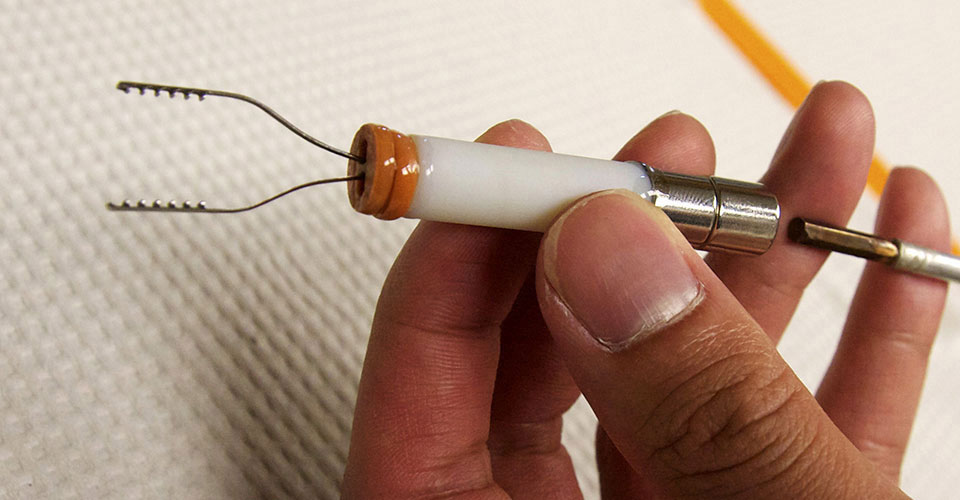Surgical Innovations Accelerator Projects Harness Unique Talents of MTM Student Teams

At the heart of the UC Berkeley-UCSF Master of Translational Medicine (MTM) program is a hands-on capstone project, where student teams work on developing medical technologies from idea to bedside. Three Surgical Innovations Accelerator projects from the Spring 2017 cycle have been selected to participate in the program this year: Percutaneous AV Fistula, Tracheostomy Alarm, and Augmented Surgical Vision, adding to a lengthy list of Surgical Innovations (SI) projects that have hosted MTM student teams. Since MTM’s launch in 2010, eight SI projects comprised of MTM students have been selected, some spanning multiple years.
The year-long MTM program blends the engineering, clinical, and entrepreneurial aspects of translating medical innovation into clinical reality. Students’ backgrounds range from bioengineering and life sciences to business and clinical experiences. SI project concepts are proposed to the MTM students, and teams are assembled to align student skills and interests with sponsor needs. Throughout the school year, team members spend approximately 10-30 hours per week on their capstones, integrating their projects into their course assignments. The focus of each project is dependent on the current development phase, potentially including technical development, prototyping, intellectual property evaluation, market scoping, or business case development.
The clinical and technical mentorship from SI paired with MTM students’ enthusiasm and focus on the business aspects of device development create an ideal synergy.
Surgical Innovations projects are built around clinician-discovered needs, which provide real-world context for MTM teams to understand translational medicine,” said Shuvo Roy, PhD, who serves as faculty lead for both initiatives, attesting to the benefits of the program’s partnership. “The collaborative nature of the projects and teams is key.
Executive Director Moose O’Donnell, PhD, agrees.
The MTM students bring a range of skills not typically found in a clinical team, including engineering design experience and interest in regulatory and business affairs. The students have the time and motivation to dig into the contextual questions to ask ‘what will it take to move this idea to the clinic.’ Most of the MTM students come to the program to learn how to advance exactly the sort of health care innovations the SI projects are developing.
 The three Accelerator projects chosen for MTM pitched their ideas to industry professionals at the Surgical Innovations Shark Tank in April 2017. The PIs look forward to the opportunity to lead their respective MTM student teams:
The three Accelerator projects chosen for MTM pitched their ideas to industry professionals at the Surgical Innovations Shark Tank in April 2017. The PIs look forward to the opportunity to lead their respective MTM student teams:
Percutaneous AV Fistula
Principal Investigator - Shant Vartanian, MD, UCSF Department of Surgery
Hemodialysis via an arteriovenous fistula has lower mortality rates than those dialyzed with a tunneled catheter and arteriovenous graft. They also have better durability, lower rates of revision, and lower rates of infection and hospitalization. This team will develop a minimally invasive, percutaneous method of creating an arteriovenous fistula in the clinic for hemodialysis patients. The MTM team members are a recent biology graduate with bench technique and animal research experience, an accomplished engineer with a background in aerospace and human factors engineering, and a biomedical engineer with experience at a major device manufacturer.
Tracheostomy Alarm
Principal Investigator - David Conrad, MD, UCSF Department of Otolaryngology
Ensuring a tracheostomy tube stays in the neck and does not fall out (accidental decannulation) is critical in the postoperative and long term care of patients with tracheostomies. This project is a wireless alarm system that senses accidental decannulation and alerts a personal electronic device or nursing station. The student team’s backgrounds include extensive research in biochemistry and genomics, clinical trial management, medical device sales, and biology.
Augmented Surgical Vision
Principal Investigators - Alan BC Dang, MD & Alexis BC Dang, MD, UCSF Department of Orthopaedic Surgery
Lighting plays a critical role in tissue visualization, surgical safety, and surgical speed. This team aims to determine the optimal spectral lighting characteristics for highlighting various tissue types and building a surgical LED array that provides optimal lighting for specific surgical procedures. The MTM team consists of a recent biology graduate with hobby interests in robotics and prototyping, a physicist who has interned with major medical device companies, and a surgical resident from Taiwan.
